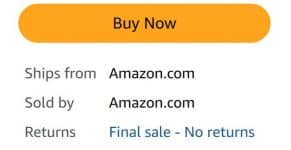Amazon Rolls Out “Final Sale” Badge
Amazon is known as the “Return Anything Store” but maybe not for long.
Amazon just made a bold move: a “non-returnable” label is now live on select product listings. While this might look like a win for sellers on the surface, a closer look reveals a different story—one that favors Amazon’s own brands and VC accounts, leaving most third-party sellers watching from the sidelines.
As of June 23, some product pages—mostly from Amazon’s private labels or vendor central (VC) partners—are displaying a “non-returnable” tag directly under the seller info. This label means exactly what it says: once the item is sold, the buyer can’t return it, and no refunds are issued.
What Does This Actually Mean for Sellers?
Unfortunately for sellers, right now the “final sale” badge is reserved mostly for liquidation items and items sold directly by Amazon. Currently, it is not an option individual third-party sellers can enable.

For items that are final sale, it seems restricted (for the time being) to items such as:
- High-value or custom items
- Slow-moving inventory or liquidation products
- Seasonal or perishable goods
It's a one-and-done policy—no returns, no refunds, period.
Return Rates Are a Real Problem
High return rates have long been a thorn in the side of Amazon sellers. In some categories, return rates can hit 30%. When Amazon introduced the dreaded “high return rate” tag, many sellers saw their order volumes tank and were forced to slash prices to move inventory—ironically leading to even more returns.
However, until Amazon allows sellers to mark their own items as final sale it won't help sellers tackle the issue of high return rates. It's worth noting that there's no indication Amazon will allow sellers to do this any time soon.
How to Stay Ahead
Until Amazon makes “final sale” an option for sellers, there are some strategies you can take to mitigate the impact of returns:
- Track policy updates closely. Amazon often tests features quietly before a broader rollout. Stay informed to move early if it becomes available for SC accounts.
- Double down on product quality and listings. Reducing return rates is still your best defense—label or no label.
- Leverage existing clearance tools. Use promotions, coupons, and off-Amazon channels to manage stale inventory.
- If you're a VC seller, test and report. Early adoption and feedback could unlock more privileges in future policy shifts.
For more on navigating Amazon's changing landscape, check out our piece on managing high-return-rate products.
Final Thoughts
Amazon’s new “non-returnable” label could be a powerful tool—but only if it reaches the broader seller base. Until then, it’s another example of how the platform gives certain sellers a leg up while others wait in line.



